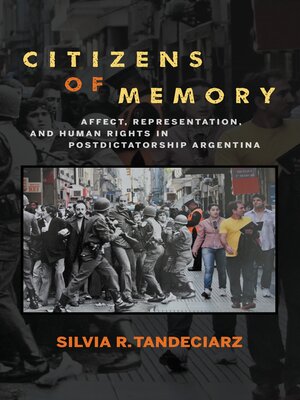Citizens of Memory
ebook ∣ Affect, Representation, and Human Rights in Postdictatorship Argentina · Bucknell Studies in Latin American Literature and Theory
By Silvia R. Tandeciarz

Sign up to save your library
With an OverDrive account, you can save your favorite libraries for at-a-glance information about availability. Find out more about OverDrive accounts.
Find this title in Libby, the library reading app by OverDrive.



Search for a digital library with this title
Title found at these libraries:
| Library Name | Distance |
|---|---|
| Loading... |
Citizens of Memory explores efforts at recollection in post-dictatorship Argentina and the hoped-for futures they set in motion. The material, visual, narrative, and pedagogical interventions it analyzes address the dark years of state repression (1976-1983) while engaging ongoing debates about how this traumatic past should be transmitted to future generations. Two theoretical principles structure the book's approach to cultural recall: the first follows from an understanding of memory as a social construct that is always as much about the past as it is of the present; the second from the observation that what distinguishes memory from history is affect. These principles guide the study of iconic sites of memory in the city of Buenos Aires; photographic essays about the missing and the dictatorship's legacies of violence; documentary films by children of the disappeared that challenge hegemonic representations of seventies' militancy; a novel of exile that moves recollection across national boundaries; and a human rights education program focused on memory. Understanding recollection as a practice that lends coherence to disparate forces, energies, and affects, the book approaches these spatial, visual, and scripted registers as impassioned narratives that catalyze a new attentiveness within those they hail. It suggests, moreover, that by inciting deep reflection and an active engagement with the legacies of state violence, interventions like these can help advance the cause of transitional justice and contribute to the development of new political subjectivities invested in the construction of less violent futures.







